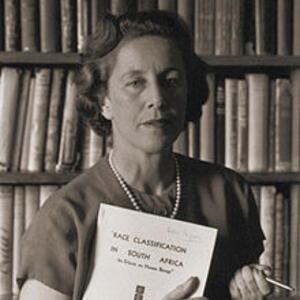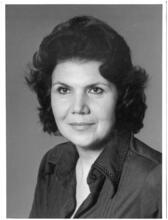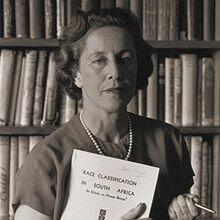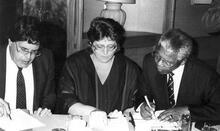Helen Suzman
Helen Suzman was born in South Africa in 1917, the daughter of two Lithuanian immigrants. She attended university and earned her Bachelor of Commerce degree, going on to become a lecturer in economic history. When the National Party came to power in 1948, she became more active in politics and in 1953 she won a position as a Member of Parliament for the United Party, the National Party’s opposition. During her thirty-six years as a parliamentarian, she fought against the hostile apartheid system and those who sought to maintain it, and concerned herself with apartheid’s erosion of civil liberties and violations of human rights. Additionally, she sought to abolish capital punishment and gender discrimination. Suzman’s achievements made her a powerful symbol of opposition in South Africa and across the world. She remained active in politics even after her retirement, until her death in 2009.
Overview
When Helen Suzman announced her retirement from parliamentary life, she received a letter from Nelson Mandela in which he wrote:
Dear Helen,
The consistency with which you defended the basic values of freedom and the rule of law over the last three decades has earned you the admiration of many South Africans.
A wide gap still exists between the mass democratic movement and your party with regard to the method of attaining those values. But your commitment to a non-racial democracy in a united South Africa has won you many friends in the extra-parliamentary movement …
(Extract of letter written from the Victor Verster Prison on May 22, 1989)
When Helen Suzman retired from politics in 1989, she had been a member of the South African Parliament for thirty-six years, during which time she had tirelessly opposed the National Party government and its apartheid policies. For thirteen of those years (1961–1974) she was the only member of the Progressive Party, resisting the apartheid government against great odds.
Suzman's courage, dedication and great ability in the parliamentary opposition to apartheid won her worldwide recognition. She was the recipient of twenty-two honorary doctorates as well as honorary fellowships from some of the world’s most prestigious universities. In 1978 she received the United Nations Award of the International League for Human Rights in recognition of the unremitting struggle that she had fought in and out of parliament for social and political justice. She also received various prestigious awards from Jewish organizations in the United States and has twice been nominated for the Nobel Peace Prize. In 1989 Queen Elizabeth II conferred on her an Honorary Dame Commander (Civil Division) of the Order of the British Empire.
Early Life
Helen Suzman was born in Germiston, South Africa on November 7, 1917. She was the daughter of Samuel (1888–1965) and Frieda Gavronsky (1888–1917), both Lithuanian immigrants. Samuel, who came to South Africa at the age of seventeen or eighteen from a (Yiddish) Small-town Jewish community in Eastern Europe.shtetl called Klykuoliai, became a successful businessman. Helen’s mother died two weeks after her birth and Samuel remarried when Helen was ten years old. After matriculating at Parktown Convent, Helen registered for a Bachelor of Commerce degree at the University of the Witwatersrand. She did not complete her studies but married Dr. Moses Meyer Suzman (1904–1994) in 1937. Following the birth of the first of her two daughters, Frances, in 1939, she returned to university to complete her degree and remained on as a lecturer in economic history. Her second daughter, Patricia, was born in 1943.
Political Involvement and Apartheid
After the National Party came to power in 1948 Helen became more actively involved in politics. Her work for the Fagan Commission on laws restricting the mobility of black South Africans had made her acutely aware of the injustices suffered by the majority of South Africans. In the 1953 election she won the Houghton constituency unopposed for the United Party, the official opposition, and represented Houghton until her retirement in 1989.
Helen was part of a small liberal wing of the United Party that broke away to form the Progressive Party in 1959 and was the only member of that party to hold her seat in the general election of 1961. For the next thirteen years she kept the liberal flame alive in parliament in an increasingly hostile and oppressive environment. She was a consummate parliamentarian, never losing an opportunity to speak, to put questions and to intercede on behalf of those who were caught up in the merciless apartheid system. She was meticulous in the preparation of her speeches and was a fine orator who could face a torrent of abuse with a biting wit. Government responses to questions in parliament were often the only source of information in the heavily censored environment of apartheid South Africa and Helen used the parliamentary arena to good effect to reveal to South Africa the full inhumanity of the apartheid system. In a famous exchange in parliament, an irritated cabinet minister shouted, “You put these questions just to embarrass South Africa overseas,” to which Helen Suzman replied, “It is not my question that embarrasses South Africa—it is your answers.”
Although Helen Suzman bore an enormously heavy parliamentary burden, she never failed as far as possible to investigate the often-tragic consequences of apartheid legislation. Although she represented an affluent white constituency, she saw herself as an “honorary ombudsman for all those people who have no vote and no Member of Parliament.”
Helen’s status as a Member of Parliament enabled her to make prison visits to inspect prevailing conditions. She first visited the prisoners on Robben Island in 1967. In his autobiography, Nelson Mandela writes: “It was an odd and wonderful sight to see this courageous woman peering into our cells and strolling around in our courtyard…” Another prisoner, the Afrikaans poet Breyten Breytenbach, described her as “Our Lady of the Prisoners.”
Criticism
While Helen Suzman’s main concern lay with apartheid’s erosion of civil liberties and the rule of law, and its appalling human costs, she also concerned herself with the abolition of capital punishment and gender discrimination, particularly as it affected African women whose status in customary law was that of “perpetual minors.” In 1988 she was instrumental in having matrimonial legislation enacted that greatly improved the legal status of women.
Helen Suzman became a powerful symbol of liberal opposition to apartheid within South Africa and abroad. However some of her actions during the years of struggle have come under criticism from the liberation movements. These include the fact that she operated within parliament, an apartheid structure of the state, and that she opposed sanctions against South Africa that she felt would minimize, not maximize, eventual liberation.
Liberal and Jewish Values
The liberal values that Helen Suzman espoused have been embedded in the constitution of democratic South Africa. After she retired from parliament, she remained active in political life and was appointed to the Independent Electoral Commission charged with overseeing South Africa’s first democratic elections in 1994. However, true to character, Helen Suzman did not not hesitate to criticize the governments of the post–1994 period.
Helen Suzman grew up in a non-observant home although her father contributed to Jewish charities. Her sense of Jewishness has an ethnic rather than a religious base and, while not an ardent Zionist herself in the sense of wanting to live in Israel, she totally supported the existence of the State of Israel. She was not involved in Jewish activities but did contribute to Jewish causes and organizations such as the Union of Jewish Women and the Women’s Benevolent Society since she believed in the Jewish value of the individual assuming responsibility for the Jewish community at large.
Helen Suzman died on January 1, 2009.
Lee, Robin. Values Alive: A Tribute to Helen Suzman. Johannesburg: 1990.
Mapai, V. et al. They Shaped Our Century: The Most Influential South Africans of the Twentieth Century. Cape Town: 1999.
Strangwayes-Booth, Joanna. A Cricket in the Thorn Tree: Helen Suzman and the Progressive Party of South Africa. Bloomington, IN: Indiana University Press, 1976.
Suttner, Immanuel, ed. Cutting Through the Mountain: Interviews with South African Jewish Activists. London: 1997.
Suzman, Helen. In No Uncertain Terms: Memoirs. Pretoria: 1993.






